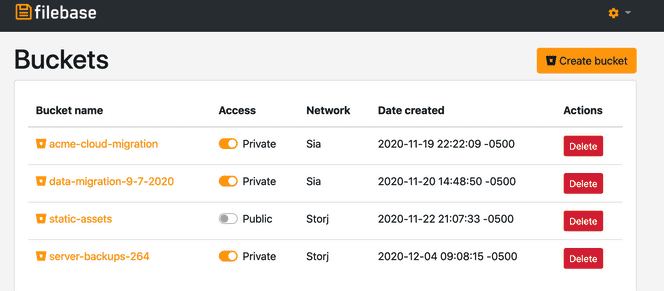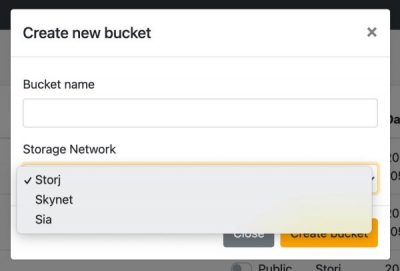Filebase Raises $2 Million
Start-up in object storage platform powered by decentralized storage networks
This is a Press Release edited by StorageNewsletter.com on April 20, 2021 at 2:32 pmFilebase, Inc., an object storage platform powered by decentralized storage networks, announced a $2 million seed round led by Multicoin Capital with participation from Version One Ventures and notable angels like Ryan Selkis.
The funds will be used to on-board customers in the pipeline and support growth by hiring more engineering, marketing, and sales talent.
The Filebase platform offers a browser-based dashboard and an S3-compatible API to deploy, access and manage data across several decentralized storage networks. It abstracts all of the interactions with the underlying networks and has turnkey configurations that help developers to move or replicate data effortlessly. The platform currently supports the Sia Network and the Storj Network and has plans to expand to the Filecoin Network and the Arweave Network by the end of 2021.

“Our mission is to make decentralized storage accessible and easy to use for everyone. We work with CTOs, CISOs, enterprises, managed service providers, and individual Web3 developers. While all of them have different motivations, they all share the same need for highly-distributed, geo-redundant storage,” said Joshua Noble, CEO and co-founder. “We’ve built a performant access layer to decentralized storage networks, which are among the most distributed and secure networks in the world, with a familiar S3-compatible interface that developers know and generally love.”
While cloud-based storage is typically inexpensive, geographically-redundant storage is not. Filebase can offer more competitive pricing and guarantee objects are redundantly stored at a replication factor of 3x across thousands of servers globally because it is built on top of several decentralized networks, which are inherently decentralized. This makes Filebase a platform for developers with valuable data or larger companies or enterprises focused on disaster recovery. These users can save up to 90% with Filebase by switching from traditional cloud storage providers.
“Decentralized storage networks are non-trivial to use. They often require developers to implement custom software, unique configurations, or special integrations. This stands in stark contrast to how the vast majority of developers are familiar with storing their data, which is on Amazon S3.” said Kyle Samani, managing partner, Multicoin Capital. “By offering a S3-compatible API, Filebase makes it ridiculously simple for developers to leverage decentralized storage networks without ever having to intersect the networks themselves.”
Decentralized storage networks can suffer from higher latency compared to centralized alternatives. To combat this, Filebase built a proprietary edge-caching technology that increases throughput and lowers response times for both ingress and egress. The caching layer achieves performance and makes it possible to build applications and experiences on decentralized networks that are indistinguishable from applications built on Amazon S3, making them a variable alternative for the first time.
“Disaster recovery is now dead simple, thanks to the native geo-replication that’s offered by decentralized networks.” said Zac Cohen, co-founder. “Enterprises and IT professionals no longer need to worry about planning for a costly and complex DR strategy.”
Comments
Filebase appears to be the entry point to several cloud storage instances powered by decentralized storage offerings. Today the product supports Storj, Skynet - public flavor of Storj - and Sia, and the team plans to add Arweave and Filecoin any time soon. All this is transparent for users and applications as the S3 API requests are served by Filebase.

We all remember many players in that P2P domain even before blockchain appeared, some disappeared, ceased their activity, got acquired or just continue to exist: BlockShare, AeroFS (acquired by Redbooth), AetherStore, Arweave, Blockade Technologies (stopped), Cloudplan, KerStor (acquired), Sia, Space Monkey, Storj Labs, Symform (acquired by Quantum then stopped), Transporter (owned by Drobo acquired by Nexsan then StorCentric now stopped), Tudzu (stopped), Universal Labs (stopped), UbiStorage (stopped), Ugloo (new iteration of UbiStorage), Wuala (acquired by LaCie then Seagate then stopped).

In other words Filebase is not a cloud storage per se but more a S3 gateway connected to multiple clouds in the back whatever these cloud expose. You can assimilate Filebase as a cloud selector, router and aggregator. All the integration is made and controlled by the company and doesn't store any data but only metadata, all data being captured by terminal clouds. Some readers start to compare them with players like Flexify. From a user or application perspective, it should be pretty similar except Filebase is dedicated to decentralized storage and masters its expertise in that area.
Filebase arrives on a market where people consider more and more object storage by its interface and not by the structure of the storage itself, how things are organized, designed and built internally. We used to qualify an object storage by several characteristics like a flat name space... among others and this disappears in favor of the promotion of the object interface a storage entity can expose. Having for instance a NAS exposing an S3 interface does the job and fill users' requests, killing the purist approach. And as the world requires unstructured data platforms exposing file sharing protocols and S3 API, NAS + S3 or S3 + NAS should be interchangeable with the access to same content without any data duplication.
For QoS, Filebase adds some caching techniques to boost data access and reduce drastically subsequent latencies.
In term of pricing, the company is pretty aggressive with $5.99/month for the first terabyte and then additional storage, and outgoing transfer is charges $0.0059/GB. Of course no ingress fees or for API requests. You can test the service super easily as the company offers 5GB. Users don't have to subscribe and enable back-end offering, the ones integrated with Filebase, everything is masked and their fee is included.
Filebase has an interesting approach if you compare with AWS S3 with 1 region covering several AZs. If you want a file stored on multiple regions, AWS charges you a pretty significant fee which is not the case with Filebase. The company leverages the dispersed aspect of their back-end storage to reach high level of data durability and multi-regions presence thanks to wide/geo erasure coding at a fraction of AWS cost.
As a security feature, Filebase forces objects to inherit the policy/ACL from its parent bucket. In other words, all objects in a bucket received the behavior of that bucket and there is no mixed mode that offers a perfect security hole in many cases. Here you have all public or all private. If users need a mix, Filebase just recommend to create one public bucket and a second private bucket. All data transfers are encrypted with TLS and on Storj data are encrypted by AES-256 and Sia uses Treefish.
![]() Founder and CEO Joshua Noble, formerly unknown in the storage industry, was formerly at Curriculum Associates and LogMeIn. Other founder is Zac Cohen with experiences at Western Digital, VKernel and VMTurbo.
Founder and CEO Joshua Noble, formerly unknown in the storage industry, was formerly at Curriculum Associates and LogMeIn. Other founder is Zac Cohen with experiences at Western Digital, VKernel and VMTurbo.














 Subscribe to our free daily newsletter
Subscribe to our free daily newsletter

